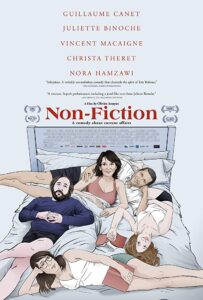Olivier Assayas’ fascinating gabfest proves to be enchanting.


In “Non-Fiction,” novelist Léonard Spiegel (Vincent Macaigne) writes in a genre referred to as “auto-fiction.” His work, that he describes as “feel-bad” books, contains elements drawn from his life. What writer doesn’t use what they know? And writer/director Assayas (see “Personal Shopper”) is possibly doing a little of that here. Whether or not he’s inserting parts of his own life, I don’t know, but you get the impression that Assayas knows the characters in this film inside and out.

As the story evolves, we learn that Spiegel is having a problem with his latest tome. His publisher, Alain (Guillaume Canet), might pass on it, but Alain’s wife, a popular television actress named Selena (Juliette Binoche), stands by Spiegel. Oh, and everyone is having an affair.
Assayas approaches the familiar dramatic material with a knowing wink—perhaps, his movie is a bit of auto-fiction. I was reminded of the work of South Korean filmmaker Sang-soo Hong, whose affair with his actress-muse has yielded more than one film that actually stars the actress-muse. One of the strengths of “Non-Fiction” is how authentic everything and everyone is in the movie. It’s a talky slice of reality, for sure, but featuring an interesting group of intellectuals, who have something to say about publishing and about life.

While the banter about e-books and blogging might get a little geeky, a specific group of viewers will feel right at home with the discussions. And the movie is shot in a way that puts us within the group, as though we’re having a wine and taking part. The meandering almost plotless development does have a rhythm to it, which is assisted by the game actors led by Macaigne and anchored by Binoche. Things even get a humorously meta toward the end.
While “Non-Fiction” is more slightly more lively than Assayas’ last film with Binoche, “Clouds of Sils Maria,” some may find it easier to digest. Once again, Binoche plays an actress, but this time one that is much more comfortable with her place in the world. The well-adjusted nature of the players here might make some wander, but underneath there’s some sadness, especially in Spielgel, whose writing reveals his true feelings, but who has a hard time expressing them in the real world.

There’s a line from Spiegel’s wife, Valérie (Nora Hamzawi), where she compliments him on not stuttering in a radio interview. This small moment shows what we’ve already noticed, he’s grown a little over the course of the film, and his neuroticism has lessened. “Non-Fiction” is about showing characters mature even when they all grown up.
